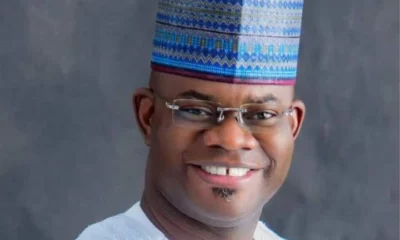Health
COVID-19: LASG Blows Hot, Warns Resident Against 4th Wave


Lagos State Government has warned of a possible fourth wave of COVID-19 infection in the country, identifying the volume of inbound passengers arriving the State for Christmas and New Year festivities, low vaccination and the anticipated social activities in the festive season as potential triggers.
The Commissioner for Health, Prof. Akin Abayomi, who disclosed this at a press briefing on the Lagos State COVID-19 response and mass vaccination strategy noted, however, that the Lagos State Government is currently implementing strategies to prevent and mitigate a possible fourth wave of COVID-19 infection.
He explained that four-pronged strategies are being employed including vaccination strategy, testing strategy, management of inbound passengers of interest into the country and managing social events during the festive season to prevent and mitigate a potential fourth wave.
The Commissioner disclosed that Lagos currently has 2.67% of its population vaccinated with two doses of the COVID vaccines, adding that the State hopes to administer eight million doses of COVID vaccines to four million people by the 25th of December this year.
Abayomi noted that the State Government, as part of its vaccination campaign mandate and approach, is partnering with the private sector to rapidly ramp up COVID-19 vaccination, stressing that the areas of collaboration include leveraging on the private sector resources on administration, logistics, distribution, pharmacovigilance and technology.
The Commissioner explained that the administration of COVID-19 vaccines remain free in public health facilities, stating that citizens may be required to pay an administrative fee of N6,000 for two doses of the vaccines in private health facilities as an alternative choice for interested persons.
He noted that those who prefer to receive the COVID-19 vaccines at private health facilities are not paying for the vaccines, but instead will be paying only an administrative charge to the private facilities for resources and technology deployed in the administration.
“Let me just for the point of clarity say that we are not charging for the vaccine; the vaccine has been given to us by the Federal Government free. We are just charging and covering the cost of the logistics and the overheads of the private sector that has been brought in under the oversight of the government to make sure that we increase the number of vaccination sites across Lagos, and make sure that every citizen of Lagos can easily access a location where they can get a free vaccine at a modest fee for vaccine administration”, Abayomi said.
While noting that the waves of COVID-19 experienced in Lagos State have been caused by seasonal increase and influx of inbound passengers from other countries into Lagos, the Commissioner disclosed that the State government is poised to strictly enforce the new international travel protocols and guidelines for vaccinated and unvaccinated inbound passengers.
Abayomi explained that the State government promulgated the Lagos State Infectious Disease Regulation 2020 and the Lagos State COVID-19 law of 2021 in response to the global pandemic, stating that prosecution of defaulters and erring citizens in mobile courts will be swift.
According to him, categories of possible offences listed in the COVID law and regulations include failure to isolate as per guidelines, failure to present for COVID PCR testing on designated days, providing false information, presenting fake PCR or vaccination certificates, breaking the rules of physical distancing at gatherings, creating super spreader events and corporate entities undermining the integrity of the State response.
Health
Cybercriminals Successfully Encrypted Data in Ransomware Attacks on Nearly 75% of Healthcare Organizations, Sophos Survey
Only 24% of Healthcare Organizations Were Able to Disrupt a Ransomware Attack Before Attackers Encrypted Their Data. This is the Lowest Rate of Disruption in 3 Years, reports SANDRA ANI


Sophos, a global leader in innovating and delivering cybersecurity as a service, today shared its sector survey report, “The State of Ransomware in Healthcare 2023,” which revealed that, among those organizations surveyed, cybercriminals successfully encrypted data in nearly 75% of ransomware attacks.
This is the highest rate of encryption in the past three years and a significant increase from the 61% of healthcare organizations that reported having their data encrypted last year.
In addition, only 24% of healthcare organizations were able to disrupt a ransomware attack before the attackers encrypted their data—down from 34% in 2022; this is the lowest rate of disruption reported by the sector over the past three years.
“To me, the percentage of organizations that successfully stop an attack before encryption is a strong indicator of security maturity. For the healthcare sector, however, this number is quite low—only 24%. What’s more, this number is declining, which suggests the sector is actively losing ground against cyberattackers and is increasingly unable to detect and stop an attack in progress.
“Part of the problem is that ransomware attacks continue to grow in sophistication, and the attackers are speeding up their attack timelines. In the latest Active Adversary Report for Tech Leaders, we found that the median time from the start of a ransomware attack to detection was only five days. We also found that 90% of ransomware attacks took place after regular business hours. The ransomware threat has simply become too complex for most companies to go at it alone. All organizations, especially those in healthcare, need to modernize their defensive approach to cybercrime, moving from being solely preventative to actively monitoring and investigating alerts 24/7 and securing outside help in the form of services like managed detection and response (MDR),” said Chester Wisniewski, director, field CTO, Sophos.


Additional key findings from the report include:
- In 37% of ransomware attacks where data was successfully encrypted, data was also stolen, suggesting a rise in the “double dip” method
- Healthcare organizations are now taking longer to recover, with 47% recovering in a week, compared to 54% last year
- The overall number of ransomware attacks against healthcare organizations surveyed declined from 66% in 2022 to 60% this year
- Compromised credentials were the number one root cause of ransomware attacks against healthcare organizations, followed by exploits
- The number of healthcare organizations surveyed that paid ransom payments declined from 61% last year to 42% this year. This is lower than the cross-sector average of 46%
“In 2016, the Red Cross Hospital of Córdoba in Spain suffered a ransomware attack that reached servers and encrypted hundreds of files, medical records and other important patient information. It was a major disruption to our operations and interfered with our ability to care for our patients. The stakes are high in ransomware attacks against healthcare organizations—and attackers know that—meaning we’ll always be a target. After this ransomware attack, we worked hard with Tekpyme to bolster our defenses, and now we have reduced our incident response time by 80%. I think the industry as a whole is making improvements, but there is still work to do, because of the constantly changing nature of cybercrime. Hopefully healthcare organizations can leverage the help that is available from security vendors such as Sophos to prevent a very real ‘threat to life’ if systems go offline due to a ransomware attack,” said José Antonio Alcaraz Pérez, head of information systems and communications at Cruz Red Andalusia in Spain.
“Cyberspace today is ripe with technically sophisticated actors looking for vulnerabilities to exploit. What all this translates to is a multidimensional cyberthreat of actors who have the tools to paralyze entire hospitals. Partnering with the private sector is critical to our mission. The information [they] share has real-world impacts and can save real businesses and real lives,” said Christopher Wray, FBI Director.
Sophos recommends the following best practices to help defend against ransomware and other cyberattacks:
- Strengthen defensive shields with:
- Security tools that defend against the most common attack vectors, including endpoint protection with strong anti-ransomware and anti-exploit capabilities
- Zero Trust Network Access (ZTNA) to thwart the abuse of compromised credentials
- Adaptive technologies that respond automatically to attacks, disrupting adversaries and buying defenders time to respond
- 24/7 threat detection, investigation and response, whether delivered in-house or by a specialized Managed Detection and Response (MDR) provider
- Optimize attack preparation, including regularly backing up, practicing recovering data from backups and maintaining an up-to-date incident response plan
- Maintain security hygiene, including timely patching and regularly reviewing security tool configurations
To learn more about the State of Ransomware in Healthcare 2023, download the full report from Sophos.com.
*The State of Ransomware 2023 survey polled 3,000 IT/cybersecurity leaders in organizations with between 100 and 5,000 employees, including 233 from the healthcare sector, across 14 countries in the Americas, EMEA and Asia Pacific.
Health
LUTH Doctor Slumps And Dies After 72hrs Call In The Neurosurgery Unit


Outrage As LUTH Doctor Dies After 72-hour Non-stop Shift
Tweeps have taken to X to share their thoughts on the death of a young doctor, identified as Dr. Umoh Michael, who died on Sunday after allegedly working 72 hours straight.
According to reports, Michael died during a church service at the United Evangelical Church on September 17. He was said to have worked a 72-hour non-stop shift at the Lagos University Teaching Hospital, Idi-Araba, where he was a resident doctor.
Doctors under the aegis of the Association of Resident Doctors, LUTH chapter, in a letter addressed to the Chief Medical Director, LUTH, Prof. Wasiu Lanre Adeyemo, attested to the fact that the young doctor was overworked.
They claimed Michael returned home at about 3:00 a.m. Sunday after a 72-hour shift in the hospital, adding that he had barely slept in their apartment before that day.
The statement partly read, “We the house officers are in deep grief over the loss of our colleague, a co-house officer (Dr Umoh Michael) who died on 17th September, 2023, after having a 72hrs call in the Neurosurgery Unit.
“He is said to have been on call 72hrs before arriving home on Sunday morning to get set for church service, reaching his worship center (United Evangelical Church) where he slumped in the church at about 11 am.”
“His roommate attested to the fact that Umoh Michael had barely slept in their apartment over the past one week as he was always on call or the day he returned home was around 3 a.m. after surgeries and other activities in the Neurosurgery Unit.”
Reacting to the sad incident, LUTH’s Public Relations Officer, Omolola Fakeye, who spoke on an online platform (not PUNCH) Online said, “It is not true that anybody worked for 72 hours. I have not been briefed about his death.
“We were at a programme yesterday (Monday), but I will find out; I can’t say anything now. I will check the medical report of what could have happened because anybody can say anything, but the medical report will show us what happened.”
May his soul rest in peace.
Health
Why You Need To Drink More Water Than You Use To


Hello! It’s the weekend, And as usual, We want to share some quick important healthy living tips with you.
Today, We will be sharing on the IMPORTANCE OF DRINKING ENOUGH WATER.
Do you know that Adult humans are 60 percent water, and our blood is 90 percent water? Now, There isn’t an agreed quantity of water that must be consumed daily. You only need to drink as plenty as you should.
Water can be said to be one of the highest natural medicines to man, As it helps avoid a lot of sicknesses like kidney stones, And it also helps in their healing process.
Here are a few importance of drinking enough water;
1. It boosts skin health and beauty: With dehydration, the skin can become more vulnerable to skin disorders and premature wrinkling.
2. It cushions the brain, spinal cord, and other sensitive tissues: Dehydration can affect brain structure and function. It is also involved in the production of hormones and neurotransmitters. Prolonged dehydration can lead to problems with thinking and reasoning.
3. It regulates body temperature: Water that is stored in the middle layers of the skin comes to the skin’s surface as sweat when the body heats up. As it evaporates, it cools the body. In sport.
4. The digestive system depends on it: The bowel needs water to work properly. Dehydration can lead to digestive problems, constipation, and an overly acidic stomach. This increases the risk of heartburn and stomach ulcers.
5. Adequate water flushes body waste easily: For sweating and removal of urine and feces.
6. The airways need it: When dehydrated, Airways are restricted by the body in an effort to minimize water loss. This can make asthma and allergies worse.
7. It helps maintain body blood pressure.
8. It prevents kidney damage: The kidneys regulate fluid in the body. Insufficient water can lead to kidney stones and other problems.
9. Consuming enough water instead of sweetened drinks helps with weight loss.
10. Joint Lubrication: Cartilage, found in joints and the disks of the spine, contains around 80% water. Dehydration can reduce the joints’ shock-absorbing ability, leading to joint pain.
Please drink enough water!
-



 Transport5 days ago
Transport5 days agoFederal Government To Launch Out 2700 CNG Buses, Tricycles Ahead Of First anniversary Of Tinubu’s Administration
-



 News4 days ago
News4 days agoNigeria Has Secured $2.25B World Bank Loan With An Interest Rate Of 1% – Minister Of Finance
-



 Tech1 day ago
Tech1 day agoAnambra School Emerges Winner In National Girls In ICT Competition With Groundbreaking VR Technology
-



 News2 days ago
News2 days agoNiger State Prisoners Run From Facility After Rainstorm Brings Down Part Of Fencing
-



 Spotlight2 days ago
Spotlight2 days agoNigerian Woman Breaks Guinness World Record With 55-Hour Interview Marathon
-



 News3 days ago
News3 days agoEFCC: Former Governor Of Kogi State, Yahaya Bello Fails To Show Up In Court, Says He Is Scared Of Arrest
-



 Finance3 days ago
Finance3 days agoGodwin Emefiele Disobeyed Direction Of Law With Intent To Harm The Public, He Printed ₦684.5M Using ₦18.9B Says EFCC in fresh charge
-



 Politics1 day ago
Politics1 day agoEnugu State Government Flag Off Palliative Distribution In The State






